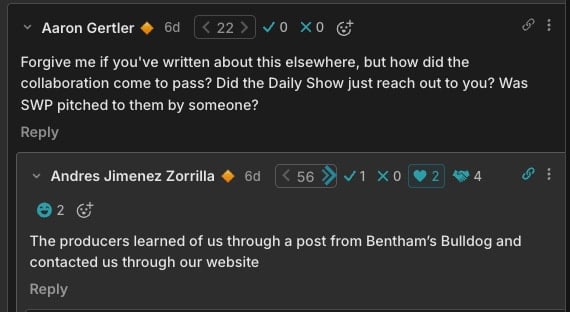In my experience, many EAs help and support others in the community (e.g., by giving feedback, emotional support, or making connections etc).
These 'helpful EAs' often improve the impact of those who receive their help (e.g., because the receivers start new collaborations, or improve their productivity or career choice etc). I'll call this impact 'indirect interpersonal impact'.
Most helpful EA's indirect interpersonal impacts are illegible (i.e., hard to capture/show). This means that many EAs who have high indirect interpersonal impact (e.g., via helping many others or being a good knowledge broker/connector etc) are undervalued relative to those who mostly focus on doing their own projects(but who may benefit from the help of many others).
I think that this is probably important to address. It seems important to acknowledge and recognize the contributions of individuals who may not necessarily have a tangible output or project to show for their efforts, but may still have had a significant positive impact on others.
With the above in mind, I am wondering if anyone has a form to capture indirect interpersonal impacts or similar, or some resources that they use or recommend using?
I am not aware of anything which exists. I would like to either adapt or make something to use myself and share with others. I think that 80,000's evaluation model is probably the best template to work from, but I haven't investigated that yet.
I'd also welcome any thoughts on the claims made above and whether they resonate or seem incorrect.



Hey! I want to give my perspective as a person who does meta work (software career coaching). I'm sharing this as another perspective, not as a disagreement.
So... I'm actually afraid of getting too much credit, not too little.
(Almost?) everyone I talk to says it's super helpful and so on to the point that I think it's a culture norm of complimenting the conversation partner, not a correlation to impact.
I do some things to make the impact measurement more objective (I can elaborate), but the reason is in order to make sure I'm having impact at all, and that I'm not deluding myself. I can say much more on this.
Another perspective on the "getting too much credit" problem:
For example, if I send someone to the 80k job board, and they take a job in GiveDirectly, and this causes $1M of extra donations.. is the impact "mine"? 80k's? GiveDirectly's? The developer's? The individual donor? This problem of "double counting" impact is very common in meta work, I think, and it too makes people (like me) probably think we are helping more than we actually are (it "feels" like I made $1M of impact).
I don't know, maybe I'm the only meta person worrying about this. Not saying this is the right answer, just that there's another side to "getting too little credit", and it is "getting too much".
(I noticed I've been nerd sniped and will probably never stop typing here, so I'm just clicking "submit", excuse my incomplete answer)
Things I do to measure myself:
- I ask at the beginning of almost every conversation "what's your default plan? what would you do if we wouldn't talk today?", and in most conversations I ask once or twice later "what's your default plan now?"
- To be clear, my standard of "made a difference" is something like "[expect to have] saved a few months of the career of the person"
- Almost all my conversations are recorded and also in a Google Doc, which means
- I can go over my own work (in practice I only did this once, when I had a small breakdown and thought I'm maybe de
... (read more)